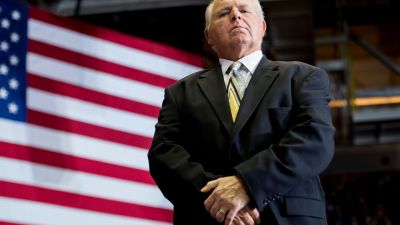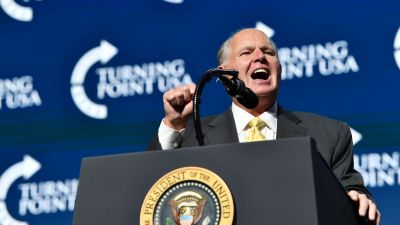
Musician Leonard Cohen performs at the Beacon Theatre on Feb. 19, 2009 in New York City. (Photo by Michael Loccisano/Getty Images)
“Do you think he died tonight just to remind us?” my colleague here at BillMoyers.com, Kathy Kiely, emailed me the morning after we got the double-dose of Donald Trump’s presidential victory and balladeer Leonard Cohen’s passing. Another colleague, Todd Gitlin said a mutual friend of his and Cohen’s thought Trump’s impending victory might just have done in the ailing 82-year-old songwriter. Whether by intention or not, a reminder Cohen did provide. His last album, released just a month ago, is titled “You Want it Darker,” which clearly alludes to his own approaching death but also applies to our electoral death: “You want it darker/We kill the flame.”
My charge is to discuss the interplay of politics and media. The traditional political media failed spectacularly in this election in ways that finally, in my estimation, helped determine the outcome. Filmmaker Ethan Coen, writing in the New York Times Magazine this week, provided the perfect sneering analysis of the media’s behavior:
Thank you for preserving reportorial balance. You balanced Donald Trump’s proposal that the military execute the innocent families of terrorists, against Hillary’s emails. You balanced pot-stirring racist lies about President Obama’s birth, against Hillary’s emails. You balanced a religious test at our borders, torture by our military, jokes about assassination, unfounded claims of a rigged election, boasts about groping and paradoxical threats to sue anyone who confirmed the boasts, against Hillary’s emails. You balanced endorsement of nuclear proliferation, against Hillary’s emails. You balanced tirelessly, indefatigably; you balanced, you balanced, and then you balanced some more.
He might have added that when FBI director James Comey issued his now-infamous letter, the mainstream media — whatever the questions about his judgment or his timing — clamped on the story like a cur and wouldn’t let go. Thus are elections lost.
But there are other media that can provide solace in these times of grief. There are films, TV shows, books, poetry and songs like Cohen’s. By his own admission, Leonard Cohen wasn’t exactly a political songwriter. His expertise was excavation of the human heart — its longings, its losses, its pains, its dreams, its strengths and its weaknesses. There will be time, once we have cycled through the stages of grief, to issue a call to arms to try to lessen the inevitable damage that the country will suffer as our new president attempts to undo 50 years of progress. But until then, the human heart isn’t a bad place to retreat, especially since this was, above all, an election of the human heart and what happens when it shrinks. It behooves us to look deeply into the national heart, as Cohen did. It won’t provide hope, but it may provide perspective. One eulogist called him “changeless.” He was.
“You Want It Darker” is Cohen’s valedictory. Delivered in a raspy purr — he once joked that he didn’t know how he could have won Canada’s “vocalist of the year” with his voice, and that was when he had a soft lyrical baritone — it is shaded with premonitions of death and hopes of final reconciliation. One of its best songs is titled “Treaty,” chronicling the treaty between two lovers. For many of us, it is an album of the national mood.
But for all his disavowals that he was his own best subject, Cohen did address politics, and those songs may be helpful now too. In “Everybody Knows,” he captured the “rigged” system long before demagogues were talking about it:
Everybody knows that the dice are loaded
Everybody rolls with their fingers crossed
Everybody knows the war is over
Everybody knows the good guys lost
Everybody knows the fight was fixed
The poor stay poor, the rich get rich
That’s how it goes
Everybody knows
And in “The Future,” from the 1992 album of the same name, he gave an all-too-accurate prediction, and gave voice to what many are feeling now:
Give me crack and anal sex
Take the only tree that’s left
And stuff it up the hole
In your culture
Give me back the Berlin Wall
Give me Stalin and St. Paul
I’ve seen the future, brother
It is murder
Things are going to slide (slide) in all directions
Won’t be nothing (won’t be)
Nothing you can measure anymore
The blizzard, the blizzard of the world
Has crossed the threshold
And it has overturned
The order of the soul
Cohen wasn’t all gloom and doom. On the same album, he sings “Democracy,” which he said was inspired by the demonstrations in Tiananmen Square in China. Those got him to thinking about American democracy. The song may seem ironic, even at points cynical, but Cohen swears it wasn’t. It was his own sense of where America was headed, albeit tortuously. . . once a long time ago.
It’s coming from the feel
that this ain’t exactly real,
or it’s real, but it ain’t exactly there.
From the wars against disorder,
from the sirens night and day,
from the fires of the homeless,
from the ashes of the gay:
Democracy is coming to the USA.
…
It’s coming to America first,
the cradle of the best and of the worst.
It’s here they got the range
and the machinery for change
and it’s here they got the spiritual thirst.
It’s here the family’s broken
and it’s here the lonely say
that the heart has got to open
in a fundamental way:
Democracy is coming to the USA.
“The heart has got to open in a fundamental way.” I admit this may seem impossibly sad now — salt in a gaping wound. But if Cohen reminds us of the pain, he also reminds us of the hope, if we remain strong enough to rekindle it.
This is what art can do. It inspires, it consoles, it teaches, it binds and it takes us out of the here and now to the everywhere and the eternal. It is why I wrote earlier this year that the all-female Ghostbusterswould tell us more about misogyny than a thousand op-ed pieces, or why the film Hell and High Water, about two aimless bank robbers, could convey a metaphysical sense of American lostness greater than the white anger and resentment that I believe largely fueled Donald Trump’s victory. Art will tell us more than the pundits ever could. It already has.
In 1968, when I was a college freshman, I traveled the country canvassing for Robert Kennedy during his brief presidential campaign. I saw him on the stump many times. I was in the room the night he was assassinated, so I know a thing or two about hopes snuffed. One thing I have always remembered all these years since was a passage from Albert Camus that Kennedy used to recite. (And, yes, there was a time when a politician could recite Camus.) It went:
To correct a natural indifference I was placed half-way between misery and the sun. Misery kept me from believing that all was well under the sun, and the sun taught me that history wasn’t everything.
So here is my advice in this period of mourning: Look to the sun and not just the misery — and look to Camus and Cohen and so many, many others. And then get ready for the struggle that lies ahead to save the country and to heal the broken heart that Cohen had spent his life investigating.




